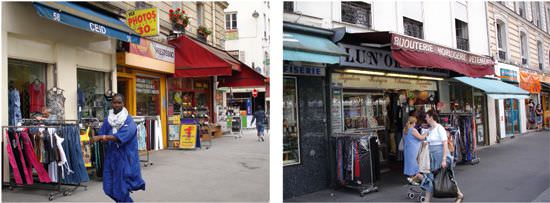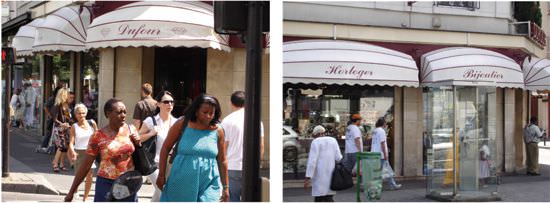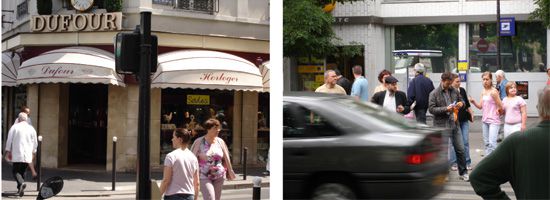
The Avenue de Flandre, in the 19th arrondissement in Paris, is a second Jerusalem. Jews and Arabs occupy the entire area. Here, there are endless shops and food stalls, where signs for halal are next to those for kosher. There are many small cafés as well—a secular nation is a nation that likes to drink. Lost in this French Middle East is a small watch and jewellery store, a survivor from the days when you could hear the mooing of cattle as they were being led to the slaughterhouses of La Villette.
This boutique is located on a corner of Rue d’Ourcq and is named Louis Dufour. To enter, you have to walk through a double-entrance security door. “I have already had six armed robberies, some more violent than the others,” explains the store’s owner, 60-year-old Guy Delande. The double door system was demanded by his in-surance company. “I either had to have it installed, or lose my insurance. I was afraid that this system would discourage clients, but actually it has had the opposite effect. Everyone feels safer now.” A bell sounds and Delande glances at the entrance, his hand in his trousers’ pocket, and then presses on a button. The first door opens, then the second.
This system does not prevent the criminals who really want to get in, often violently. Two years ago, a few thugs broke through the double doors, smashed the windows, and got away with a lot of merchandise. “The whole break-in lasted only one or two minutes, not more. They were Georgians. I know this because one of them is now in the Prison de la Santé,” adds Delande in a calm voice. He doesn’t seem to be very extrovert, yet with his grey trousers, short-sleeved white shirt, and club tie, he has a very pleasant appearance. You might think he had been sent down from central casting for a role in Desperate Housewives.
Guy Delande is not a watchmaker but rather a mechanical engineer and, earlier, he worked for IBM. He got into the watch business because of “love”, he says, adding that he married the daughter of Louis Dufour. The shop seems to be doing quite well even if it is the last of the Mohicans. “In 1960, there were thirteen watch and jewellery stores along the street. Now there are only two,” he muses. Two? That is saying a lot. The other store must date back to the ark.
With its Bordeaux walls, the Louis Dufour boutique is very attractive. “My clientele is 95 percent local,” he adds, “and my best sales’ periods are December and June-July.” These translate into the year-end holiday season and the coming of nice weather, which has “a positive effect on people’s morale”. The festival periods for the Jews and Muslims are not good sales periods for his business. “They generally return to their own communities, during which the neighbourhood is rather deserted.”
Guy Delande’s sales follow the current trend in France where jewellery is replacing the watch. “About 60 to 65 percent of sales come from jewellery, 25 percent from watches, with the rest coming from repairs. Still, the proportion of watch sales at our store is higher than other places.” His remarks are confirmed by Pierre Burnet, President of the Ile-de-France section of the National Association of Watch and Jewellery Professionals. “On average, jewellery represents 85 percent of a store’s sales, versus 15 percent for watches,” explains Burnet.

Delande’s shop carries all price ranges of watches—from the low-end to the high-end. Among the French brands that he sells are Pierre Lannier, Fontenay, and Beuchat, while among the Swiss brands are Tissot, Rado, and Frederique Constant. He also sells a fashion brand: Guess, which is one of his bestsellers, along with Tissot and Festina. “The majority of my sales are in the 100 to 300 euro range.”
The world of watches and jewellery is “a small milieu”, adds Delande. “I know my suppliers quite well. I don’t think I have a large enough store to be able to negotiate better conditions, but I can, however, have an additional month for making the payments.” The after-sales service is an essential part of his business and allows him to maintain a loyal following of clients. Yet, the repair time can sometimes be long. It depends on the brands, and ranges from 10 to 15 days for Pierre Lannier, four weeks for Rado and Tissot, but six weeks for Festina. While Guy Delande knows the basics of a watch’s operation—“I am a mechanical engineer, after all”—he does not venture into its innards. He stops at changing the batteries.
The time will eventually come when he has to pass the reins to someone else, but to whom? “My daughter is not interested in this type of work.” Another watch or jewellery retailer? Perhaps, but Delande does not believe this will happen because it is too difficult to find a taker who wants to run a store in this working-class neighbourhood in Paris. There could be offers since the store is well placed, but the more likely taker will be one of the trendier businesses such as cell phones. The problem for Guy Delande is a clause in his contract with his parents-in-law that mandates him to sell the business to a watch and jewellery retailer. “I am going to have to convince them otherwise,” he sighs.
The eventual closing of this watch boutique will not, however, signal the end of this type of business in France. Pierre Burnet firmly believes in the longevity of this type of small store. “In every small city, there is a watch and jewellery retailer. It is an essential local business,” he says, “like the baker or the butcher.

Jewellery can be sold in large volumes in larges stores but watches are different. They are not viable without after-sales service. So, who is better than a local retailer to assure this connection between the client and the repairer?”
Nice conviction. “There will always be occasions,” adds Burnet, “such as baptisms, communions, weddings, Saint-Valentine’s Day, etc. A trip to the jeweller makes a piece of jewellery important and gives it its symbolic value. When a woman bemoans the loss of a favoured piece, she is not crying for financial reasons, but rather for emotional reasons.” The relationship with a watch is a little different. “A timepiece is more of an accessory, but it can also be a beloved object, one that becomes a companion to the person who wears it.”
The role of the watch/jewellery retailer is thus not on the verge of extinction in France. The independent stores, which make up the vast majority of retailers, still have many good days ahead of them. They will endure as long as someone is putting a ring on a finger or a watch on a wrist.
Source: Europa Star August-September 2008 Magazine Issue





